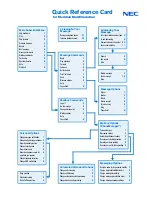
Output A
Output B
Output Select Switch
Receiver Level Controls (1 and 2)
Monitor Select Switch
Monitor Level Control
DC Input
Monitor Output
(rear panel)
Balanced Audio Output Jack: TA3M-type connector. Pin 1: ground (shield); Pin 2: “audio +”;
Pin 3: “audio -”. Use the included TA3M to XLRM interface cable to connect the receiver output
to a balanced microphone-level input on a camera, mixer or integrated amplifier.
Balanced Audio Output Jack: TA3M-type connector. Pin 1: ground (shield); Pin 2: “audio +”;
Pin 3: “audio -”. Use the included TA3M to XLRM interface cable to connect the receiver output
to a balanced microphone-level input on a camera, mixer or integrated amplifier.
The rear panel provides two balanced audio outputs (Outputs A & B). The unit is equipped with
an output select switch that assigns a signal to each of the audio outputs, as follows:
Output A (left) can be assigned either Receiver Channel 1 or Mix. (Mix = Ch. 1 and Ch. 2
signals mixed together. The relative levels of each signal can be adjusted using the individual
receiver level controls.)
Output B (right) can be assigned either Receiver Channel 1, Receiver Channel 2, or Mix.
Note: Output B is not active when Power Switch is in “1” position.
Typical configuration: Output A is assigned Channel 1; Output B is assigned Channel 2, feeding
individual channels in a mixer or camera. Many other options are available, providing much
flexibility. For instance:
• If your camera doesn’t accept two inputs, you can sum the signal from both transmitters
in Output A and connect this mixed signal to your camera.
• You can connect Output A (mixed signal) to a camera, and Output B (mixed signal)
to an audio mixer.
• When using the unit with a single transmitter with both outputs active (Power Switch set
at Both), Output A can be used to feed a camera, while Output B can feed an audio mixer
(both with identical signals from Receiver Channel 1).
The signal levels of each receiver signal (Receiver Channel 1 and Receiver Channel 2) may
be adjusted using these controls. When the outputs are assigned to a single receiver signal,
these controls will adjust the output level. (Turn clockwise to increase output level.) When the
outputs are assigned to Mix, these controls adjust the relative levels between the
receiver signals.
This switch assigns a signal to the monitor headphone output.
• Choose
1
(left position) to hear Channel 1 in both ears (mono signal, stereo output);
• Choose
2
(right position) to hear Channel 2 in both ears (mono signal, stereo output);
• Choose
OUT
(middle position), to hear Output A in the left ear, and Output B in the right ear.
The level control (volume control) for headphones is independent of other level controls.
Turn to the right to increase the volume.
You may connect the unit to an external power supply (12V DC source, 500 mA nominal
current, not included). In this case, move the Power Switch to the “Ext” position; both receiv-
er channels are activated (indicated by illumination of Power/Peak LEDs 1 and 2).
1
/
4
" TRS jack.
7
10
17
14
11
16
13
15
10
11
12
5
6
13
14
15
16
17
13
12
12
PIN 1
PIN 3
PIN 2


































